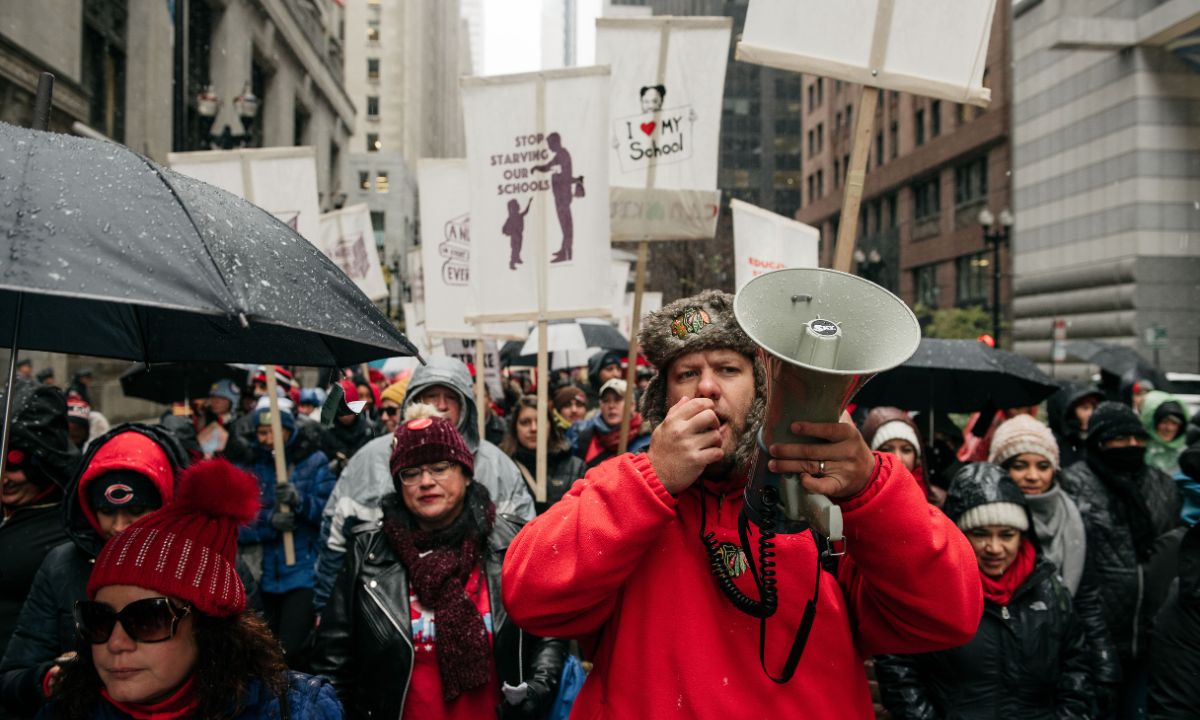Chicago Is Running Out of Money. Its Teachers Union Wants 9% Raises Anyway
Aldeman: The district has hired 2,000 teachers since 2018 and is paying them 16% more even as enrollment dropped by 38,000 students.

Get stories like this delivered straight to your inbox. Sign up for The 74 Newsletter
Everything seemed to be going well. Thanks to a new state funding formula passed in 2017, followed by a one-time infusion of aid from the federal government in the wake of COVID-19, Chicago has been able to add teachers and other staff while raising salaries.
At the end of the last school year, with the teacher contract expiring, the union released an extensive list of demands, asking for even more staffing and a minimum of 9% annual raises for the next four years.
But over the last few months, the budget reality has started to hit home. The district is considering taking out a high-interest $284 million loan to cover this year’s operating budget. And next year, the city will face a shortfall of $982 million.
The math is not that complicated. Chicago has more employees and is paying them higher salaries than before the pandemic, even as it has lost student enrollment. According to state data, Chicago added 895 general teachers and 1,140 special education teachers from 2018-19 to 2023-24. Across all categories of teachers and administrators, Chicago added the equivalent of 3,448 more full-time staff members, an increase of 17%.
Chicago Has More Teachers and Administrators

Over the same time period, Chicago lost 38,000 students, a drop of 10.5%. With more employees serving fewer students, the district dramatically lowered its staffing ratios. In elementary schools, for example, it reduced its student-to-teacher ratio from 24.5 to 1 in 2018 to 18.5 to 1 in 2023.
Chicago has also not skimped on salaries for those employees. In 2019, an analysis by the National Council on Teacher Quality found that Chicago already paid its educators more than any district in the country. That didn’t stop the union from going out on an 11-day strike or eventually winning what then-Mayor Lori Lightfoot called a “historic” contract that raised the teacher salary schedule by 16% over five years.
But that figure is underselling what actually happened, because individual teachers continued to move up the salary ladder. As an example, consider a new hire who started teaching in Chicago right out of college in 2019-20. That novice would have earned $54,547 the first year. By year five, the salary would have jumped to $67,444, a 24% raise over five years. Of course, pay varies by experience level, but teachers with master’s degrees earned increases of 20% to 38% over the same period. Inflation also rose a lot over that time, but almost all Chicago teachers did better.
In fact, despite adding a lot more new teachers, who tend to come in on the lower end of the salary schedule, average teacher pay in Chicago rose from $68,153 five years ago to nearly $88,000 last year. That’s a five-year increase of $19,055, or 28%.
Chicago Is Paying Higher Salaries

Going forward, the district’s budget office has offered annual raises of 4% to 5%, and even at that level it already projects a substantial budget deficit. The union is asking for a minimum of 9%, compounded annually for the next four years. That works out to at least a 41% increase, and that’s before taking into account teachers advancing up the salary ladder. District officials estimate these increases would put Chicago into a $4 billion hole by the end of the contract.
Chicago’s first-ever school board election next month will go a long way toward determining the fate of these proposals. Will Johnson be able to deliver another “historic” win for the teachers union? And if so, how will he pay for it?
Get stories like these delivered straight to your inbox. Sign up for The 74 Newsletter

;)
